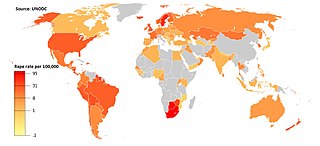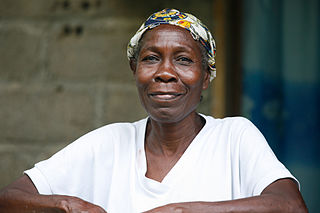Some victims of rape or other sexual violence incidents are male. It is estimated that approximately one in six men experienced sexual abuse during childhood. Historically, rape was thought to be, and defined as, a crime committed solely against females. This belief is still held in some parts of the world, but rape of males is now commonly criminalized and has been subject to more discussion than in the past.
Sexual violence is any harmful or unwanted sexual act or attempt to obtain a sexual act by violence or coercion, act to traffic a person, regardless of the relationship to the victim. This includes forced engagement in sexual acts, attempted or completed acts and occurs without the consent of the victim. It occurs in times of peace and armed conflict situations, is widespread, and is considered to be one of the most traumatic, pervasive, and most common human rights violations.
Girl power is a slogan that encourages and celebrates women's empowerment, independence, confidence and strength. The slogan's invention is credited to the US punk band Bikini Kill, who published a zine called Bikini Kill #2: Girl Power in 1991. It was then popularized in the mainstream by the British girl group Spice Girls in the mid-1990s. According to Rolling Stone magazine, the Spice Girls' usage of "girl power" was one of the defining cultural touchstones that shaped the Millennial generation.
Victim blaming occurs when the victim of a crime or any wrongful act is held entirely or partially at fault for the harm that befell them. There is historical and current prejudice against the victims of domestic violence and sex crimes, such as the greater tendency to blame victims of rape than victims of robbery if victims and perpetrators knew each other prior to the commission of the crime.

Sexual assault in the United States armed forces is an ongoing issue which has received extensive media coverage in the past. A 2012 Pentagon survey found that approximately 26,000 women and men were sexually assaulted that year; of those, only 3,374 cases were reported. In 2013, a new Pentagon report found that 5,061 troops reported cases of assault. Of the reported cases, only 484 cases went to trial; 376 resulted in convictions. Another investigation found that one in five women in the United States Air Force who were sexually assaulted by service members reported it, for one in 15 men.
Pro-feminism refers to support of the cause of feminism without implying that the supporter is a member of the feminist movement. The term is most often used in reference to men who actively support feminism and its efforts to bring about the political, economic, cultural, personal, and social equality of women with men. A number of pro-feminist men are involved in political activism, most often in the areas of gender equality, women's rights, and ending violence against women.
Diana E. H. Russell was a feminist writer and activist. Born and raised in Cape Town, South Africa, she moved to England in 1957, and then to the United States in 1961. For the past 45 years she was engaged in research on sexual violence against women and girls. She wrote numerous books and articles on rape, including marital rape, femicide, incest, misogynist murders of women, and pornography. For The Secret Trauma, she was co-recipient of the 1986 C. Wright Mills Award. She was also the recipient of the 2001 Humanist Heroine Award from the American Humanist Association. She was also an organizer of the First International Tribunal on Crimes against Women, in Brussels in March 1976.

Rape culture is a setting, studied by several sociological theories, in which rape is pervasive and normalized due to societal attitudes about gender and sexuality. Behaviors commonly associated with rape culture include victim blaming, slut-shaming, sexual objectification, trivializing rape, denial of widespread rape, refusing to acknowledge the harm caused by sexual violence, or some combination of these. It has been used to describe and explain behavior within social groups, including prison rape and in conflict areas where war rape is used as psychological warfare. Entire societies have been alleged to be rape cultures.
Date rape is a form of acquaintance rape and dating violence. The two phrases are often used interchangeably, but date rape specifically refers to a rape in which there has been some sort of romantic or potentially sexual relationship between the two parties. Acquaintance rape also includes rapes in which the victim and perpetrator have been in a non-romantic, non-sexual relationship, for example as co-workers or neighbors.
The anti-rape movement is a sociopolitical movement which is part of the movement seeking to combat violence against and the abuse of women.

Women in Haiti have equal constitutional rights as men in the economic, political, cultural and social fields, as well as in the family.
Maureen Cain received her bachelor's degree from London School of Economics in 1959, and she attained her PhD from the London School of Economics in 1969. After graduating from LSE, Cain became a professor.
Slut-shaming is the practice of criticizing people, especially women and girls, who are perceived to violate expectations of behavior and appearance regarding issues related to sexuality. The term is used to reclaim the word slut and empower women and girls to have agency over their own sexuality. Gender-based violence can be a result of slut-shaming primarily affecting women. It may also be used in reference to gay men, who may face disapproval for promiscuous sexual behaviors. Slut-shaming rarely happens to heterosexual men.
Unacknowledged rape is defined as a sexual experience that meets the legal definition of rape, but is not labeled as rape by the victim. Instead, the victim may label the experience as "bad sex", a "miscommunication", or a regrettable hook-up. This response is more frequently recognized among victims of acquaintance rape, date rape or marital rape.

Kim Sawchuk is a professor in the Department of Communication Studies, Research Chair in Mobile Media Studies, and Associate Dean of Research and Graduate Studies at Concordia University in Montreal Canada. A feminist media studies scholar, Sawchuk's research spans the fields of art, gender, and culture, examining the intersection of technology into peoples lives and how that changes as one ages.
Rape schedule is a concept in feminist theory used to describe the notion that women are conditioned to place restrictions on and/or make alterations to their daily lifestyles and behaviours as a result of constant fear of sexual assault. These altered behaviours may occur consciously or unconsciously.
Gender, Place & Culture: A Journal of Feminist Geography is a peer-reviewed journal published 12 times a year by Taylor & Francis. It is the leading international journal in feminist geography and it aims to provide "a forum for debate in human geography and related disciplines on theoretically-informed research concerned with gender issues".
Rape myths are prejudicial, stereotyped, and false beliefs about sexual assaults, rapists, and rape victims. They often serve to excuse sexual aggression, create hostility toward victims, and bias criminal prosecution.
Girl studies, also known as girlhood studies, is an interdisciplinary academic field of study that is focused on girlhood and girls' culture that combines advocacy and the direct perspectives and thoughts of girls themselves. The field officially emerged in the 1990s after decades of falling under the broader field of women's studies. Scholars within girl studies examine social and cultural elements of girlhood and move away from an adult-centered focus. Those working in the field of girl studies have studied it primarily in relation to other fields that include sociology, psychology, education, history, literary studies, media studies, and communication studies. Girl studies seeks to work directly with girls themselves in order to analyze their lives and understand the large societal forces at play within them. Scholars in girl studies also explore the connection the field has to women's studies, boyhood studies, and masculinity studies. There are many different definitions of what a girl is. Some may say that a girl is under the age of 18. Catherine Driscoll discusses how in the nineteenth century, girls were traditionally defined as younger than the age of consent. Claudia Mitchell and Jacqueline Reid-Walsh discuss girlhood beginning from birth to late twenties. Girlhood is often designated by age and consists of imitating observed and learned adult behavior.

Carceral feminism is a critical term for types of feminism that advocate for enhancing and increasing prison sentences that deal with feminist and gender issues. The term criticises the belief that harsher and longer prison sentences will help work towards solving these issues. The phrase "carceral feminism" was coined by Elizabeth Bernstein, a feminist sociologist, in her 2007 article, "The Sexual Politics of the 'New Abolitionism'". Examining the contemporary anti-trafficking movement in the United States, Bernstein introduced the term to describe a type of feminist activism which casts all forms of sexual labor as sex trafficking. She sees this as a retrograde step, suggesting it erodes the rights of women in the sex industry, and takes the focus off other important feminist issues, and expands the neoliberal agenda.





